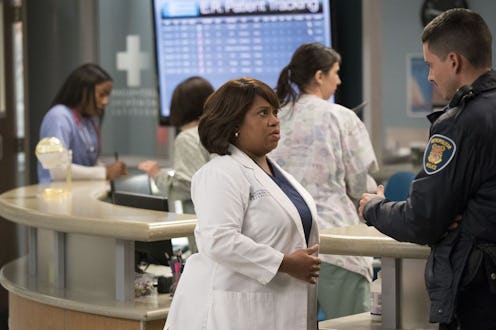Entertainment
What Happened To Miranda Bailey On 'Grey's Anatomy' Will Make You So Emotional

Spoilers ahead for the Feb. 1 episode of Grey's Anatomy. Shonda Rhimes' medical show teased one heck of a cliffhanger in its last episode — Miranda Bailey. At another hospital. Having a heart attack. Say what? Would this show really kill off one of its major and original characters? Luckily, Miranda Bailey didn't die on Grey's Anatomy, but her heart attack was serious and life threatening. To boot, it highlighted a very important feminist issue — that of women not being taken seriously when they have medical issues.
According to the American Heart Association, heart attack symptoms for women are not the same as heart attack symptoms for men, so, when a woman is having one, she commonly thinks its something else. Female heart attack symptoms include pressure in the chest, nausea, a sweaty feeling, and shortness of breath, and these feelings, especially if isolated, are pretty vague. They could also mean a flu or a cold or something. Miranda knew well enough to get herself checked out, but when she went to her local hospital, they dismissed her as a hysterical woman. Worse, they dismissed her as a hysterical woman doctor who has a history of mental illness (Miranda has experienced symptoms of obsessive compulsive disorder in the past) and stress in her life. SMH, doctors. The cardio chief of the hospital even got a psychiatric consult for Miranda when Miranda insisted on a second opinion.
That's when Miranda got fed up, and dropped some major stats on the psych doctor. Most women who die of coronary artery disease — 64 percent — don't have previous symptoms, according to the Centers for Disease Control and Prevention. And as ProPublica points out, black women are more likely than white women — 22 percent more likely, in fact — to die from heart disease, according to CDC data. And, in the time that these doctors sat there and refused to take Miranda's assertions seriously, Miranda's condition worsened, and she had to call in the big guns — Maggie and Webber — to get herself treated. Miranda survived, but for many women, that extra time spent trying to convince a doctor that they're sick can be deadly. In an interview with Entertainment Weekly, Chandra Wilson, who plays Miranda, said she really wanted the episode to drive that point home.
“What we really wanted to talk about in this episode, especially for women, is heart disease, how it manifests, how much of a killer of women it is, and how to be taken seriously when you walk into an emergency room situation so that you can be properly diagnosed and properly treated."
Prior to the episode resolving that Bailey would be OK, fans worried that she would be the next longtime star to depart the show. “Is Bailey leaving?" Wilson repeated in her EW interview. "I think this is the right thing to say: Bailey’s been stressed and needs to take care of herself.” And it's true. To put it in the nicest way possible, Miranda is a workaholic. She's been that way since the beginning. This episode was the first time that viewers had gotten any real look into Miranda's backstory, and now it's easy to see why she engulfs herself so completely in her work.
Miranda was raised by a very overprotective mother who barely wanted her to leave the house. That's how Miranda lived her whole life, but she eventually found out that her mother was so protective because Miranda had an older sister who died of SIDS when she was two months old. Simply put, Miranda's mother was scared of losing another child. This is understandable, but it was hard on Miranda. When she finally left for college and medical school, she worked hard to forget her mother's voice saying that the world is an unpredictable and dangerous place.
But, Miranda also knows that bad things happen (she works at Grey Sloan Mercy Death after all), and, by the end of the episode, she's reminded that she has to live. And, she has to assert herself in order to do that. Just like she did when she fought for her right to treatment, she needs to remember that there are things outside of work, too. It seems like she acknowledged that by the end of the episode — calling her mother for the first time in a long time.
This heart attack, now that she's escaped the danger, is a whole new lease on life for Miranda. But, most importantly, it was a fictional example of a real world issue that of women's pain getting ignored. Hopefully this episode encouraged its female viewers to pull a Miranda and advocate for themselves when no one else will.